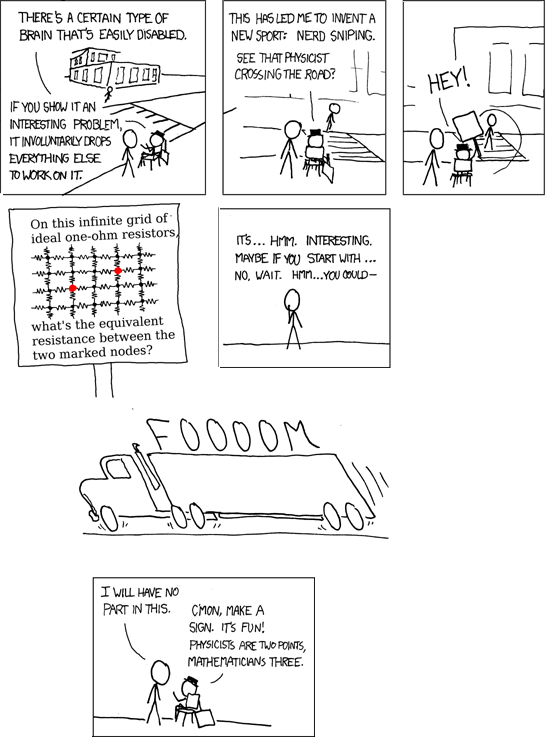I of course work with many nerds. I was in a meeting at work the other day when someone explained that they had been working on a task but had not been able to finish. Instead, they'd gotten sidetracked with creating a script to do the work. "Sorry, I'm easily nerd-sniped," they concluded.
I got the sense immediately, I thought—that is, they'd gotten caught up in an interesting task. But I didn't think I'd ever heard it expressed as nerd-sniped before. So I had a look. The term seems to have originated in an xkcd cartoon[1]:
 (I had to rearrange the panels so they'd fit here, sorry.)
(I had to rearrange the panels so they'd fit here, sorry.) Randall Munroe, the xkcd author, presents nerd sniping as a competitive sport that picks on certain types of victims. But it also works as a general term of sending someone (perhaps oneself) down an interesting path that disrupts whatever one is supposed to be working on.
Michael Graham, a.k.a. Engineer Dog, wrote a blog entry in which he teased out some threads from Munroe's original cartoon. For example, he theorizes about why certain people might be more susceptible to being nerd-sniped:
While it sounds like a joke, nerd sniping is kind of a serious problem for some folks. Engineers in particular are highly susceptible because of our natural curiosity and fondness for creative problem solving. It’s not difficult to find something that will draw our attention away from the current task at hand and replace it with a new problem to figure out.
He also notes a difference between being nerd-sniped and just wasting time:
If you’re looking at Facebook when you should be working then at least you understand that you’re not going to accomplish anything. A snipe, on the other hand, is disguised as productive activity. When you come across a new and interesting project that you simply must work on immediately, you do so at the cost of anything else you could be doing with your limited resources. While it still feels like you are making progress on your to-do list, in reality you are no better off than when you started.
This is what happened to my colleague. They got entranced by an interesting problem and welp, there went the rest of the day: nerd-sniped.
 Ok, on to origins. This week my wife looked up from her reading and asked, "What's a gibbous moon again?" Uh … I had to look it up also. It's a phase of the moon between half and full. There's a waxing gibbous moon and a waning gibbous moon. (One reason we're not as familiar with gibbous as we might be is that at our house, a gibbous moon is referred to as a "potato moon.")
Ok, on to origins. This week my wife looked up from her reading and asked, "What's a gibbous moon again?" Uh … I had to look it up also. It's a phase of the moon between half and full. There's a waxing gibbous moon and a waning gibbous moon. (One reason we're not as familiar with gibbous as we might be is that at our house, a gibbous moon is referred to as a "potato moon.")
Whence the word gibbous? The word gibbus was Latin for "hump." This led in later Latin to a word gibbosus, which was a term for "humpbacked." According to a "Did you know?" note on the Merriam-Webster site (short answer: I did not), gibbous was a general term for the rounded features of plants or animals. For example, there's a cite in the OED from 1577: "The forme of the lyuer is gibbous or bunchy on the backside." As late as 1879, someone was described as having "a gibbous chest."
In astronomy, the term gibbous was used to describe the moon as far back as the late 1600s. There are more cites about the gibbous moon, but the term can also apply to other discs that show phases. ("Many moons and planets full, Crescent, or gibbous-faced.")
Now that I know this, it feels like it would be a service to the language to reintroduce gibbous in its more general sense. For example, I could describe my own belly as gibbous. Hmm. Maybe I'll have to think about this some more.
Like this? Read all the Friday words.
 |
|

 |
|
